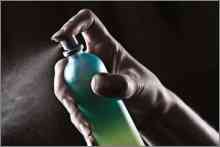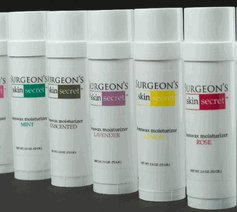|
How the Products In Your Home May
Be Harming Your Intimate Life
by www.SixWise.com
Of the estimated 72,000 new chemicals that have surfaced since World War II, only 2 percent of them have ever been tested for safety. The rest of them are floating around in our air, settling in our soil and water, and even lingering in products you use daily in your home.
|

Your perfume may not be so sexy after all.
|
So it's no surprise that one specific class of these chemicals -- endocrine disruptors -- may be wreaking havoc on your body, including getting in the way of a fulfilling sex life.
What is an Endocrine Disruptor?
It's a synthetic chemical that harms your endocrine system. The foundation of your endocrine system are hormones and glands. Endocrine glands -- such as the pituitary, thyroid, adrenal, thymus, pancreas, ovaries, and testes -- send 20 major hormones directly into your bloodstream so they can be transported to cells in other parts of your body. As your body's chemical messengers, hormones transfer information and instructions from one set of cells to another.
Endocrine disruptors, however, mimic or block hormones and thereby disrupt normal functions in your body. According to the Natural Resources Defense Council, this disruption can happen through:
-
Altering normal hormone levels
-
Halting or stimulating the production of hormones
-
Changing the way hormones travel through your body, thus affecting the functions that these hormones control
Along with increasing your risk of certain cancers and damaging your nervous system, endocrine disruptors are linked to reproductive disorders, including:
Infants, children and developing fetuses, whose organs and bodies are still developing, are most at risk.
What Kinds of Products Should I Watch Out For?
|
Clean and Moisturize Your Skin Naturally ... With No Phthalates or Other Harmful Chemicals!

SixWise.com is committed to researching and providing you cosmetic products that are natural, effective and free of harmful toxins like phthalates. No matter what your skin type, there is a safe product for you -- and these products come with our highest approval!
Check Out the Top-Recommended Safe Skin Care Products
|
1. Hairsprays, perfumes and cosmetics
These are often contaminated with phthlates, chemicals that can cause reproductive and developmental harm, organ damage, immune suppression, endocrine disruption and cancer. As much as possible, purchase only phthalate-free cosmetics.
2. Plastics
Things like plastic water bottles, baby toys, pacifiers, baby bottles, food containers, and liners for cans often contain bisphenol-A (BPA), which mimics the female hormone estrogen and may affect fertility and promote cancer.
3. Pesticides (including flea treatments)
Insecticides in homes and offices and for lawns and gardens -- and in flea treatments for pets -- have been linked with decreased male fertility.
Avoid the use of toxic pesticides in your home and yard (opt for natural pesticides that you can find in your local health food store instead). Meanwhile, avoid chemical bug repellants, flea treatments or lice shampoos.
Instead of commercial lice treatments, opt for the 100-percent safe Lice B Gone -- clinically proven to safely remove lice and nits without dangerous pesticides or chemicals. And instead of chemical flea treatments, choose Flea 'n Tick B Gone; it's 100-percent safe and does not contain harmful pesticides or chemicals.
|

Plastic food containers and utensils may be a no-no for your reproductive health.
|
4. Laundry detergents, disinfecting and all-purpose cleaners
These contain alkylphenols (including nonylphenol, octylphenol, and their small ethoxylates), which are classified as endocrine disrupters because they can mimic female estrogen hormones in the body. Spot removers, hair color and other hair care products, and spermicides also contain alkylphenols.
Seek out natural cleaning supplies for your home as much as possible, such as Vermont Soap Organics Liquid Sunshine.
Recommended Reading
Girls Hitting Puberty at Younger & Younger Ages
Why are More Boys than Girls Being Born?
Sources
Natural Resources Defense Council
AlSearsMD.com
|